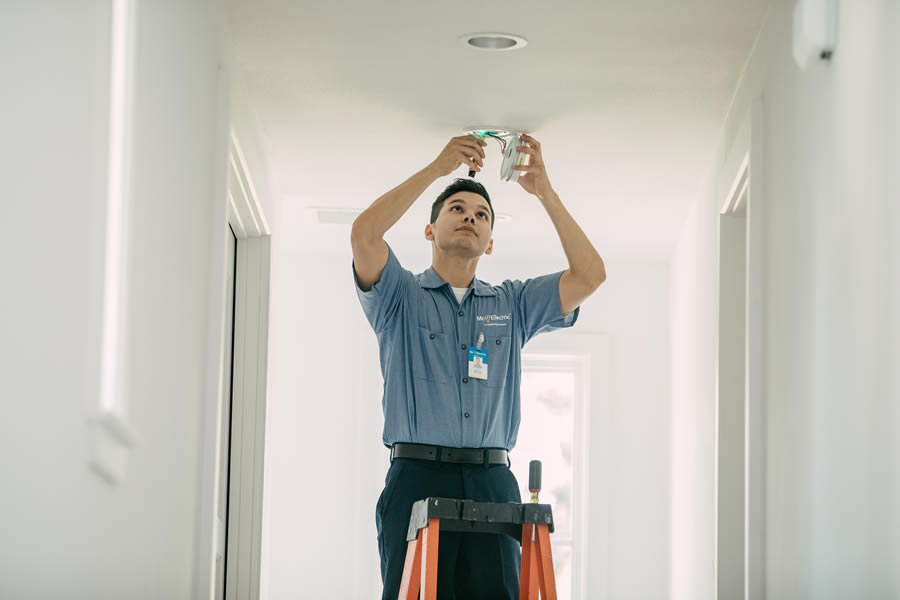Emergency Certified Electricians in Dallas, TX.
Call this Tuesday to Get 10% OFF
Emergency Certified Electricians in Dallas, TX.
Call this Tuesday to Get 10% OFF

Do you know the difference between residential and commercial electrical wiring? While both types of wiring deliver electricity throughout a building, there are distinct differences in their design, materials, load capacity, and installation methods. If you’re undertaking an electrical wiring project, it’s important to know the differences between the two types of wiring.
In this article, our electricians go into the fundamental differences between residential and commercial electrical wiring. Our specialists have handled a wide range of electrical wiring projects in both residential and commercial properties. Therefore, we know a thing or two about different types of electrical wiring. When you need dependable electrical wiring services, look no further than the experts at Mr. Electric.
One of the key differences lies in the amount of power required and how that power is delivered. Residential properties normally rely on a single-phase power system, which provides 120 to 240 volts. This is sufficient to power household lighting, appliances, and outlets. In contrast, commercial properties use a three-phase power system. This configuration delivers power more efficiently and supports larger electrical loads, such as operating elevators, industrial equipment, commercial HVAC systems, and extensive lighting networks.
In residential settings, non-metallic sheathed cable is widely used. This type of wiring is easy to install, cost-effective, and suitable for the less demanding electrical loads found in homes. The wires are wrapped in a plastic sheath and run through walls, attics, and crawlspaces.
Commercial wiring, however, requires more durable and fire-resistant materials. Wires are enclosed in metal conduit or armored cable for added protection against environmental damage, physical wear, and fire hazards. THHN (Thermoplastic High Heat-resistant Nylon-coated) wire is commonly used in commercial applications due to its heat resistance and durability. This added protection helps commercial wiring meet the stricter safety standards required for high-occupancy or public buildings.
Another key difference is the complexity of the electrical system. Residential wiring systems are simpler, with fewer circuits and a more straightforward layout. On the other hand, commercial electrical systems are more complex. A typical office building or retail space may have multiple electrical panels, backup generators, dedicated circuits for high-demand equipment, and a variety of voltage levels across different areas. These systems are carefully designed by commercial electricians to accommodate future expansion, emergency systems, and ongoing maintenance needs.
Electrical codes vary between residential and commercial environments. Commercial buildings are subject to more stringent regulations due to the higher risks associated with public access and the scale of the infrastructure. These codes cover everything from wire insulation types and grounding requirements to emergency lighting and fire protection systems.
Inspections and permits are also more rigorous in commercial settings. Commercial electricians must stay up-to-date with constantly evolving code requirements, making experience and licensing especially important for work in business and industrial environments.
Commercial electrical wiring systems are designed with maintenance in mind. Conduits are often exposed or run through accessible ceiling spaces to allow for easy inspections, repairs, or upgrades. In residential homes, wiring is usually hidden behind walls and insulation, making access more difficult and time-consuming for repairs or modifications.
If you’re in need of professional electrical wiring services, trust the experienced, licensed, and friendly electricians at Mr. Electric. Perhaps you’re building a new home and need new construction wiring, or your older home needs to be rewired to improve safety and meet code requirements. Or maybe you’re experiencing wiring problems such as faulty connections, tripped circuit breakers, or flickering lights, and you need fast electrical repair. No matter what your needs are, Mr. Electric is the name you can trust when you need reliable and budget-friendly electrical services.